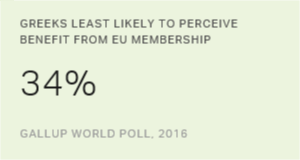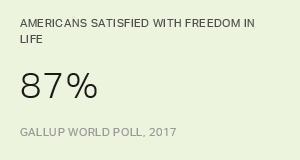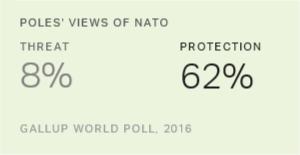Story Highlights
- 52% of Poles confident in their judicial system and courts
- Majorities in 14 EU member states have faith in rule of law
WASHINGTON, D.C. -- Ahead of Poland's purge of its Supreme Court on Wednesday, Poles' confidence in their judicial system had reached the majority level for the first time in a decade. Fifty-two percent of Poles surveyed in 2017 -- in the wake of mass protests against what were then only proposed changes to their judiciary -- expressed confidence in their courts.

Like they did last July, tens of thousands of Poles took to the streets last week after the government forced the retirement of Supreme Court justices older than age 65 -- or about one-third of the court's 72 judges. The new law essentially puts Poland's ruling Law and Justice party and the president in full control of the country's judicial system.
The move also continues to put Poland at odds with the European Union, which filed legal action on July 2, alleging that Poland is in breach of its obligations under EU law. Some view the situation in Poland as a test case of the EU's ability to preserve the rule of law throughout the bloc, where majorities in 14 member countries, including Poland, currently express confidence in their respective judicial system and courts.
| Yes, confident | No, not confident | ||||||||||||||||||||||||||||||||||||||||||||||||||||||||||||||||||||||||||||||||||||||||||||||||||
|---|---|---|---|---|---|---|---|---|---|---|---|---|---|---|---|---|---|---|---|---|---|---|---|---|---|---|---|---|---|---|---|---|---|---|---|---|---|---|---|---|---|---|---|---|---|---|---|---|---|---|---|---|---|---|---|---|---|---|---|---|---|---|---|---|---|---|---|---|---|---|---|---|---|---|---|---|---|---|---|---|---|---|---|---|---|---|---|---|---|---|---|---|---|---|---|---|---|---|---|
| % | % | ||||||||||||||||||||||||||||||||||||||||||||||||||||||||||||||||||||||||||||||||||||||||||||||||||
| Denmark | 85 | 15 | |||||||||||||||||||||||||||||||||||||||||||||||||||||||||||||||||||||||||||||||||||||||||||||||||
| Finland | 83 | 17 | |||||||||||||||||||||||||||||||||||||||||||||||||||||||||||||||||||||||||||||||||||||||||||||||||
| Luxembourg | 76 | 21 | |||||||||||||||||||||||||||||||||||||||||||||||||||||||||||||||||||||||||||||||||||||||||||||||||
| Ireland | 74 | 25 | |||||||||||||||||||||||||||||||||||||||||||||||||||||||||||||||||||||||||||||||||||||||||||||||||
| Austria | 73 | 24 | |||||||||||||||||||||||||||||||||||||||||||||||||||||||||||||||||||||||||||||||||||||||||||||||||
| Netherlands | 71 | 28 | |||||||||||||||||||||||||||||||||||||||||||||||||||||||||||||||||||||||||||||||||||||||||||||||||
| Sweden | 69 | 26 | |||||||||||||||||||||||||||||||||||||||||||||||||||||||||||||||||||||||||||||||||||||||||||||||||
| Germany | 68 | 29 | |||||||||||||||||||||||||||||||||||||||||||||||||||||||||||||||||||||||||||||||||||||||||||||||||
| United Kingdom | 68 | 31 | |||||||||||||||||||||||||||||||||||||||||||||||||||||||||||||||||||||||||||||||||||||||||||||||||
| Belgium | 60 | 38 | |||||||||||||||||||||||||||||||||||||||||||||||||||||||||||||||||||||||||||||||||||||||||||||||||
| France | 59 | 38 | |||||||||||||||||||||||||||||||||||||||||||||||||||||||||||||||||||||||||||||||||||||||||||||||||
| Estonia | 55 | 27 | |||||||||||||||||||||||||||||||||||||||||||||||||||||||||||||||||||||||||||||||||||||||||||||||||
| Poland | 52 | 38 | |||||||||||||||||||||||||||||||||||||||||||||||||||||||||||||||||||||||||||||||||||||||||||||||||
| Malta | 51 | 47 | |||||||||||||||||||||||||||||||||||||||||||||||||||||||||||||||||||||||||||||||||||||||||||||||||
| Czech Republic | 50 | 40 | |||||||||||||||||||||||||||||||||||||||||||||||||||||||||||||||||||||||||||||||||||||||||||||||||
| Hungary | 50 | 42 | |||||||||||||||||||||||||||||||||||||||||||||||||||||||||||||||||||||||||||||||||||||||||||||||||
| Croatia | 48 | 49 | |||||||||||||||||||||||||||||||||||||||||||||||||||||||||||||||||||||||||||||||||||||||||||||||||
| Lithuania | 46 | 40 | |||||||||||||||||||||||||||||||||||||||||||||||||||||||||||||||||||||||||||||||||||||||||||||||||
| Portugal | 45 | 46 | |||||||||||||||||||||||||||||||||||||||||||||||||||||||||||||||||||||||||||||||||||||||||||||||||
| Cyprus | 42 | 43 | |||||||||||||||||||||||||||||||||||||||||||||||||||||||||||||||||||||||||||||||||||||||||||||||||
| Greece | 42 | 45 | |||||||||||||||||||||||||||||||||||||||||||||||||||||||||||||||||||||||||||||||||||||||||||||||||
| Spain | 42 | 56 | |||||||||||||||||||||||||||||||||||||||||||||||||||||||||||||||||||||||||||||||||||||||||||||||||
| Romania | 41 | 42 | |||||||||||||||||||||||||||||||||||||||||||||||||||||||||||||||||||||||||||||||||||||||||||||||||
| Slovakia | 39 | 53 | |||||||||||||||||||||||||||||||||||||||||||||||||||||||||||||||||||||||||||||||||||||||||||||||||
| Italy | 30 | 69 | |||||||||||||||||||||||||||||||||||||||||||||||||||||||||||||||||||||||||||||||||||||||||||||||||
| Latvia | 30 | 49 | |||||||||||||||||||||||||||||||||||||||||||||||||||||||||||||||||||||||||||||||||||||||||||||||||
| Slovenia | 29 | 70 | |||||||||||||||||||||||||||||||||||||||||||||||||||||||||||||||||||||||||||||||||||||||||||||||||
| Bulgaria | 22 | 64 | |||||||||||||||||||||||||||||||||||||||||||||||||||||||||||||||||||||||||||||||||||||||||||||||||
| Â鶹´«Ã½AV World Poll, 2017 | |||||||||||||||||||||||||||||||||||||||||||||||||||||||||||||||||||||||||||||||||||||||||||||||||||
What makes what happens next in Poland's situation so important is that it is not the only EU member country at odds with the bloc on this issue. For example, Hungarian Prime Minister Viktor Orban and his party also face accusations of infringing on judicial independence, including stacking the courts, that could potentially cost them EU funding. Still, 50% of residents in the country in 2017 expressed confidence in their judicial system.
As their governments have continued to draw the ire of the European Commission, the leadership of the EU has remained fairly popular among Poles and Hungarians, who have viewed membership in the bloc as a benefit. In fact, at the time of the surveys, Poles and Hungarians were more likely to express confidence in the EU's leadership than in their own national government. In Poland, for example, 57% of residents said they were confident in the EU's leadership while 50% expressed confidence in their own.
Takeaway: Critics see recent changes to court systems in Poland and in Hungary as undermining judicial independence and potentially threatening democracy in these countries and elsewhere in the EU. However, at least as of last year, half or more of adults in these two countries -- and many others throughout the bloc -- still had faith in the bedrock of the EU and democracy, the rule of law.
Survey Methods
Results are based on telephone and face-to-face interviews with approximately 1,000 adults, aged 15 and older, conducted in the 28 EU member countries. For results based on the total sample of national adults in Poland, the margin of sampling error is ±3.6 percentage points at the 95% confidence level. All reported margins of sampling error include computed design effects for weighting.
Learn more about how the works.
For complete methodology and specific survey dates, please review .



